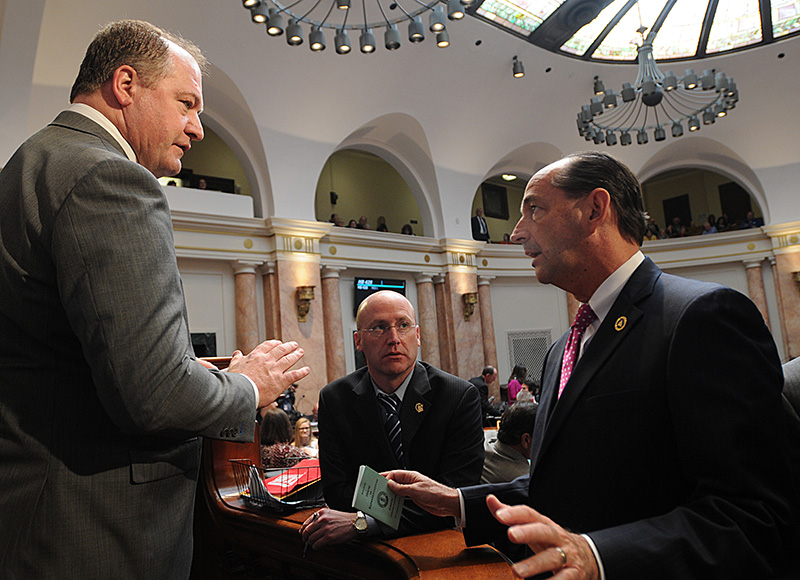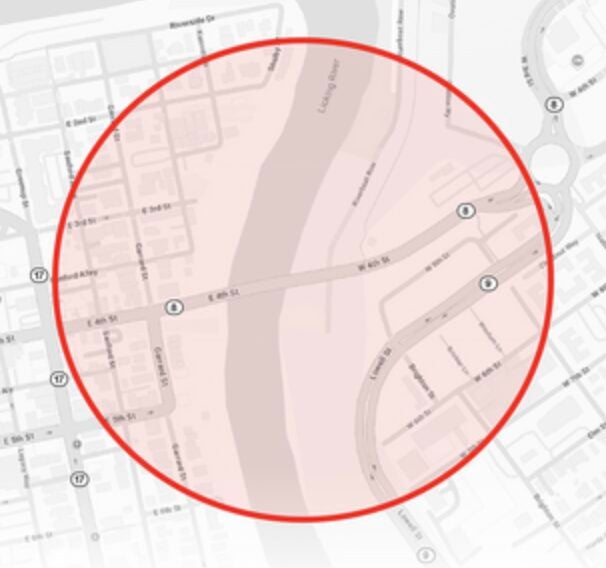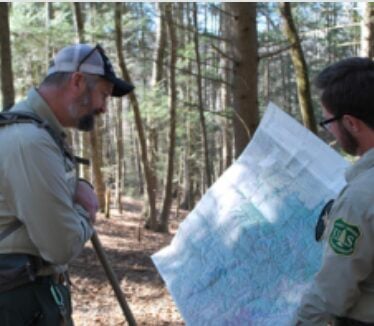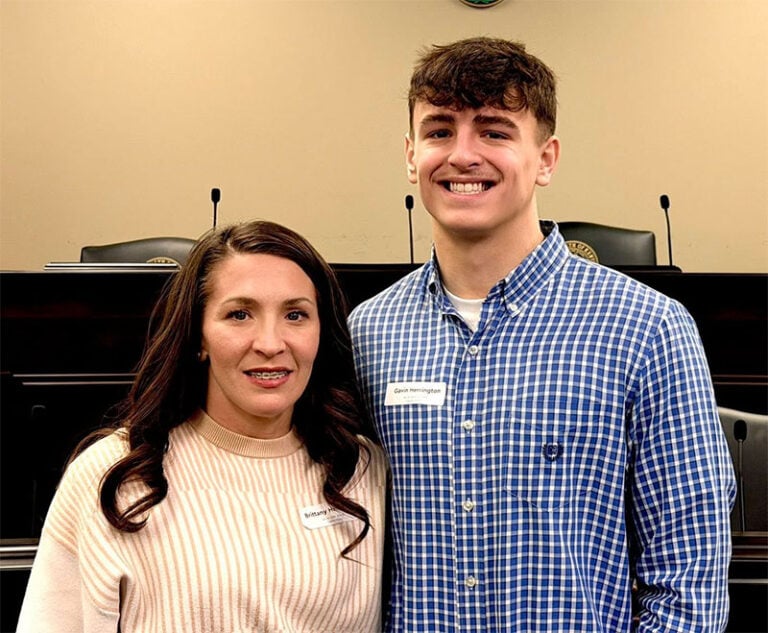Staff report
The Kentucky Senate gave approval to a sweeping measure to reorganize the Kentucky Horse Park Commission. The move comes in response to a recent audit that uncovered incredible financial mishandlings at the Kentucky Horse Park, including questionable practices, and potential conflicts of interest. House Bill 403, sponsored by Rep. Phillip Pratt, R-Georgetown, and championed by Senator Damon Thayer for several years, will confirm action taken by Governor Bevin last year to overhaul the park’s management.
“Every entity spending taxpayer dollars should, and will, be held to the highest standard of scrutiny,” said Rep. Pratt.
According to an audit released last month by State Auditor Mike Harmon, the Kentucky Horse Park has suffered from a combination of poor management, questionable practices, and potential conflicts of interest. The lack of proper management has prevented the Horse Park from becoming financially self-sufficient, requiring $24.8 million in state subsidies over the past decade.

To ensure ethical management in the future, House Bill 403 will reduce the Horse Park Commission membership from 17 to 15 members, create new appointment terms, and grant to Governor the ability to appoint two members to oversee the commission, among other things.
The bill will now head to Governor Bevin, where it is expected to be signed into law.
* * *
House Bill 368 was approved by the Senate and sent to the Governor. It provides incentives for future growth of e-commerce operations in Kentucky.
Amazon announced in January that it is bringing a $1.5 billion hub to Northern Kentucky, resulting in an immediate 2700 jobs with more expected in the future.
As part of the package to lure the company to Kentucky, the Legislature has approved a $1 million annual aviation fuel tax incentive which will solidify the current investment and encourage future growth.
“In order for Kentucky to be at the forefront of e-commerce, it is imperative that we are forward thinking and take the initiative to anticipate the ever-evolving model of today’s businesses,” said Rep. Diane St. Onge, the bill’s primary sponsor.
To receive the credit, the bill requires certified air carriers to spend in excess of $1 million in sales and use tax on the purchase of aircraft fuel, including jet fuel, in Kentucky.
* * *
The Kentucky State Senate gave final approval to a measure to eliminate shock probation for people convicted of second degree manslaughter or reckless homicide while driving under the influence. The purpose behind the legislation is to let the sentence stand once one has been handed down or a plea agreement is reached.
House Bill 222 addresses current law which allows judges to use their own discretion when deciding to shorten an offender’s sentence in exchange for probation.
“The family or loved ones of these victims should never suffer the additional pain of seeing the perpetrator released prior to the completion of their sentence,” said Rep. Benvenuti. “Those that choose to weaponize their vehicles by driving under the influence should take notice that shock probation will no longer be available to save them from serving their prescribed sentence.”
The measure passed both chambers and will be sent to Governor Bevin for signature.
* * *
This week, the Kentucky State Senate reached final passage on a bill aimed to prevent registered sex offenders from stepping foot on a publicly owned playground without written permission from authorities.
Specifically, House Bill 38 adds public playgrounds to a preexisting state law that makes it illegal for registered sex offenders to enter high schools, middle schools, elementary schools, preschools, and licensed daycare facilities.
The legislation passed the House in February by a resounding margin. After thoughtful consideration in the Senate, the measure passed unanimously.
The bill will now head to the Governor’s desk for final consideration.
* * *
The Senate gave approval to House Bill 195 which allows the Kentucky Adult Education Program to establish programs in connection with the College and Career Readiness Standards for Adult Education.
Once a student completes the College and Career Readiness program and passes a qualifying test, he or she is eligible to receive his or her High School Equivalency Diploma (HSED).
“We want everyone to have access to high school diploma equivalency programs,” said Rep. Tipton. “It is well-documented that those with a high school diploma are better able to find jobs that pay well and in turn provide not only for themselves but for their families. This measure makes the HSED more accessible to potential students.”
The bill also ensures students who have received their HSED in the past will not have those diplomas invalidated because of a change in testing procedures.
HB 195 now heads to the Governor’s desk for his signature.
* * *
House Bill 100, a bill that will tighten the Kentucky whiskey requirements and limit the Kentucky label to whiskey produced from grains that are cooked, fermented, and distilled in Kentucky has passed both houses.
The bill lays out requirements for being considered a Kentucky vintage distilled spirit. Specifically, the whiskey has to be in its original, unopened container and not owned by a distillery.
The purpose of this bill is to provide a geographic indicator to set apart Kentucky bourbon from other whiskeys sold in the United States. With the rise of bourbon’s popularity in recent years, other distillers in the country are attempting to put “Kentucky Bourbon” on their products. This legislation is aimed to protect Kentucky distillers from that misleading practice.
* * *
The Senate gave final passage to a measure this week to expand the state’s broadband access by codifying the Kentucky Communications Network Authority (KCNA). Created through an executive order, KCNA is responsible for managing the Commonwealth’s open-access broadband network known as KentuckyWired. KentuckyWired’s focus is to position Kentucky as a national leader in high-capacity internet services.
House Bill 343 will specifically help rural communities that do not have access to a broadband network.
Kentucky currently ranks near the bottom of national and international rankings of broadband capacity, putting our state at a major disadvantage for attracting jobs and expanding education. The KCNA, through KentuckyWired, will better the Commonwealth by promoting economic growth and drastically improving our quality of life.
* * *
The Senate passed House Bill 112, legislation that will reverse a Supreme Court opinion which punishes landlords for the responsibilities of their tenants. House Bill 112 changes the definition of a dog owner, in order to protect a landlord from the actions of a dog that does not belong to them, but to their tenant.
This legislation was needed in response to a 2012 Kentucky Supreme Court decision which for the first time held a landlord liable for the actions of their tenant’s pets.
This legislation will amend the current statue and return the law to its original form.
* * *
The Senate gave final passage to a measure this week that continues to cut the red tape in Kentucky. On average, 600 regulations are filed in Kentucky every year and 73 percent of these regulations have not been substantively amended since 2012.
House Bill 50 mandates that ordinary regulations automatically expire seven years after their last effective date and for regulations that were effective prior to July 1, 2012 to expire on July 1, 2019.
This is just one of many bills passed by the New Majority that is part of Governor Bevin’s Red Tape Reduction Initiative, a concerted effort to review every regulation currently on the books. The goal is to help spur job creation and investment, change the attitude of government from regulation makers to regulation managers, and to get government off the backs of Kentuckians.
The bill also requires agencies to maintain and publish a list of all regulation numbers and their corresponding effective dates. If an agency chooses to keep a regulation effect beyond seven years, it can file a certification letter rather than going through the entire process of re-filing, thus saving taxpayer dollars.
* * *
The Senate moved for passage on a measure to remove outdated “roadhouse” inspection laws off the books. House Bill 26, sponsored by Adam Koenig, R-Erlanger, will remove from the books an archaic statutory requirement which was passed decades ago requiring Sheriffs to inspect “roadhouses” and dance halls.
“I am grateful for the Senate’s resounding support for reducing red tape and regulatory burden on our Sheriffs,” said Rep. Koenig. “This bill is commonsense legislation that makes Kentucky laws more effective and updated. This measure will reduce duplication of process and prevent confusion amongst jurisdictions.”
The purpose of this law was to report to the circuit court and the grand jury their findings of any facility operating illegal gaming operations, but fell out of practice roughly 30 years ago. Alcohol Beverage Control now assumes most of the responsibilities that the soon-to-be-repealed statute handed to local law enforcement.
* * *
Others headed to Governor for his signature:
Senate Bill 17, which would specify that students in Kentucky’s public schools, colleges and universities could express their religious and political opinions in their school work, artwork speeches and clothing, and be allowed to distribute political materials on school grounds and use school media to announce religious meetings. The bill now has passed both chambers.
House Bill 14, which would make it a hate crime to attack a police officer, firefighter or emergency medical professional, adding them to the categories of individuals protected by law because of race, religion, sexual orientation or national origin.
Senate Bill 50, sponsored would allow school districts to operate on a “variable student instructional year” that would offer the same 1,062 or more hours of instructional time that’s required for students under current rules. Districts wouldn’t have to meet the state’s 170-day rquirement as long as students receive the number of hours’ worth of instruction equivalent to 170 days.
House Bill 269 – This would allow relatives who are currently ineligible for employment in a school district to serve as substitutes for certified or classified personnel, so long as they are not employees or contract employees of the district.
House Bill 35 — Kentucky would become one of more than 31 states that allow for the creation of public benefit corporations — companies that make investments in a public benefit, or public good, as part of their corporate philosophy. Although their mission is to maximize profits, a portion must go toward a charitable purpose.
House Bill 67 would keep autopsy photos private, providing additional protections against release of autopsy photographs, videos and other images to non-essential outlets such as the news media and internet bloggers.
House Concurrent Resolution 59 – This measure designates April 6 as the World War One Centennial Day in the Commonwealth.

















